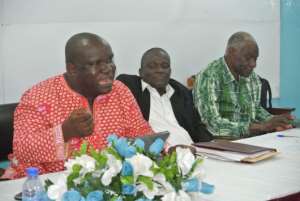
Journalists at a workshop on Genetically Modified Organisms (GMOs) have called on Parliament not to rush the passage of the Plant Breeders Bill.
They said Parliament should allow for more stakeholder engagement on the bill and also subject the reading of the bill to a more rigorous debate to ensure that only what was good for Ghana was passed into law.
The workshop, organised by the Graphic Communications Group Limited (GCGL) and the Centre for Indigenous Knowledge and Organisational Development (CIKOD), a non-governmental organisation, was designed to provide journalists with smore information on GM foods so that they could set the agenda on the quest for the genetically engineered foods in the country.
The journalists, therefore, decided to submit a resolution to Parliament, urging the legislators to delay the passage of the bill until a national forum was held to get the inputs of all interest groups.
Speaking at the opening ceremony of the workshop attended by more than 40 journalists, the Managing Director of the GCGL, Mr Kenneth Ashigbey, urged media personnel to acquire adequate knowledge about GMOs to be able to educate the public on the subject so that they could make informed choices.
He advised journalists to be particularly abreast of national issues so that they could hold authorities accountable for their actions.
GMOs
Professor Walter S. Alhassan, a Biotechnology Consultant in his presentation said no visible adverse effects of GMOs on farmers had been recorded yet.
He said all the negative perceived attributes of the Genetically Modified Technologies (GMT) also occurred in conventional crops.
Professor Alhassan said GMOs were formed when genes (hereditary material) were moved artificially from one species to another.
He said while the anti-GM agencies had enhanced awareness creation activities, they had created lots of anxiety among the public.
According to him, the problems that the adoption of GMOs in Ghana are likely to face included infrastructure facilities and other support services such as market for the food and warehousing.
Mr Bernard Guri of the Centre for Indigenous Knowledge and Organisational Development (CIKOD) said there was a lack of scientific consensus on claims of benefits of GMOs.
Difference between biotechnology and GM biotechnology
A member of Food Sovereignty, a grass-roots food advocacy movement, Mr Yaw Opoku, said there was a difference between biotechnology and GM biotechnology, adding that it was unfortunate that scientists would not want to make that clear for people to make informed choices.
Mr Opoku said biotechnology referred to the application of science and technology to agriculture, while GM biotechnology referred to the transference of genes from any species, either plant or animals to crops.
He said GMO was a system that had health impacts on humans and animals, as well as socio-economic impacts on farmers and their families.
Mr Opoku said Section three of ACT 831 of the Biosafety Law required that a biosafety authority (technical committee) had to be instituted to do risk management and assessment of GM foods already on the market.




 Tuesday’s downpour destroys ceiling of Circuit Court '8' in Accra
Tuesday’s downpour destroys ceiling of Circuit Court '8' in Accra
 SOEs shouldn't compromise on ethical standards, accountability – Akufo-Addo
SOEs shouldn't compromise on ethical standards, accountability – Akufo-Addo
 Father of 2-year-old boy attacked by dog appeals for financial support
Father of 2-year-old boy attacked by dog appeals for financial support
 Jubilee House National Security Operative allegedly swindles businessman over sa...
Jubilee House National Security Operative allegedly swindles businessman over sa...
 Nobody can order dumsor timetable except Energy Minister – Osafo-Maafo
Nobody can order dumsor timetable except Energy Minister – Osafo-Maafo
 Mahama wishes National Chief Imam as he clock 105 years today
Mahama wishes National Chief Imam as he clock 105 years today
 J.B.Danquah Adu’s murder trial: Case adjourned to April 29
J.B.Danquah Adu’s murder trial: Case adjourned to April 29
 High Court issues arrest warrant for former MASLOC Boss
High Court issues arrest warrant for former MASLOC Boss
 Align academic curriculum with industry needs — Stanbic Bank Ghana CEO advocates
Align academic curriculum with industry needs — Stanbic Bank Ghana CEO advocates
 Election 2024: We'll declare the results and let Ghanaians know we've won - Manh...
Election 2024: We'll declare the results and let Ghanaians know we've won - Manh...
